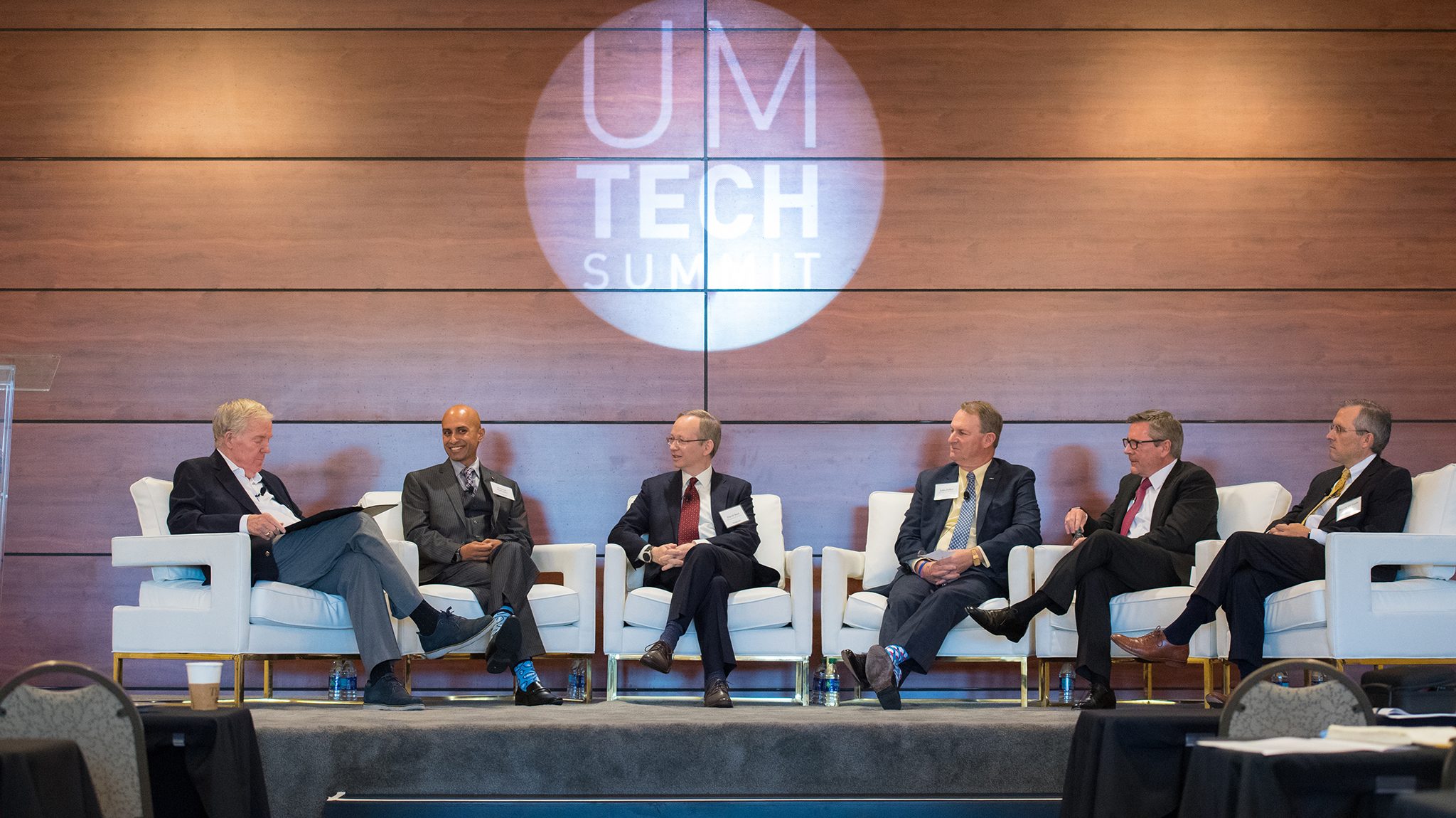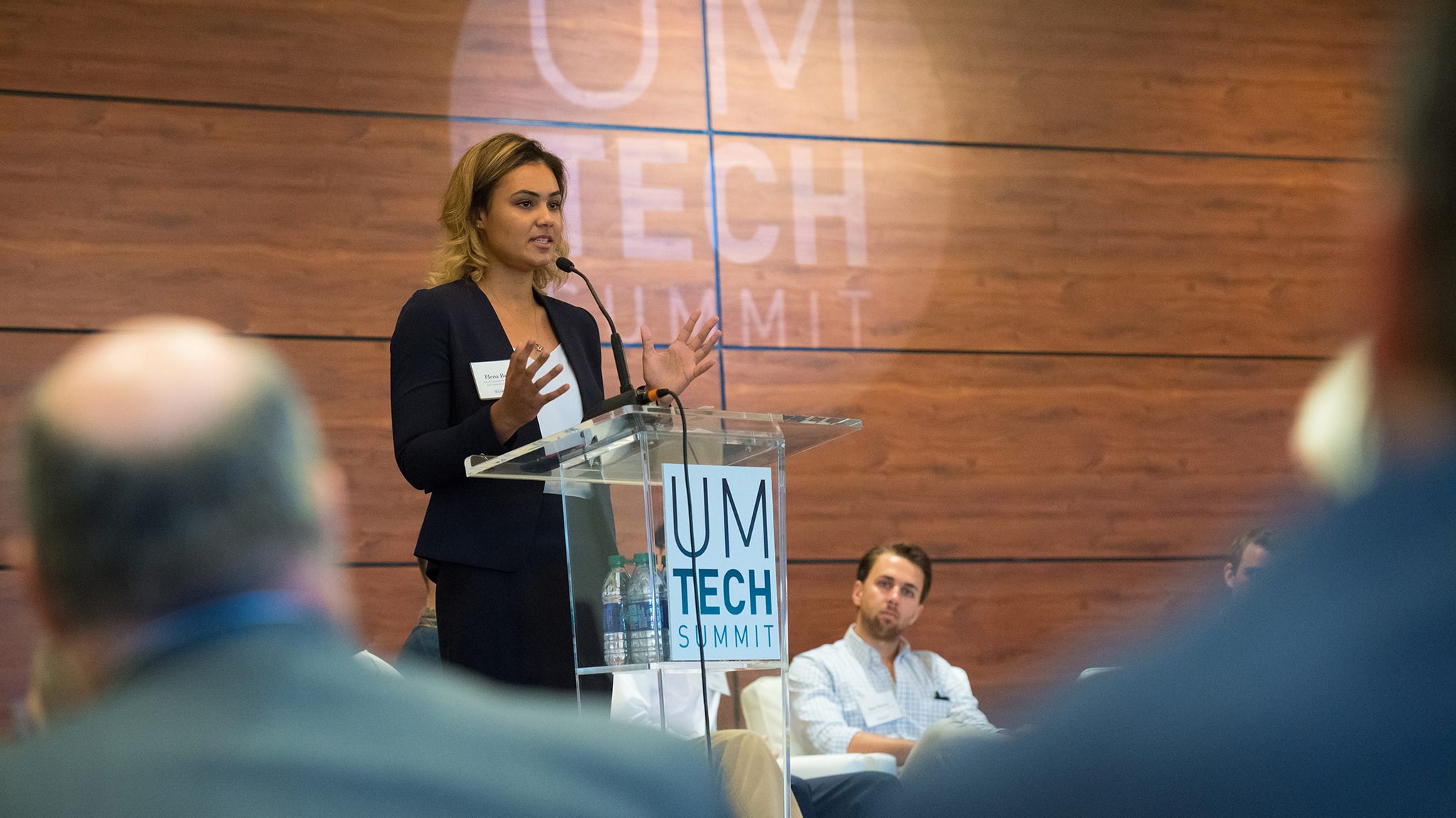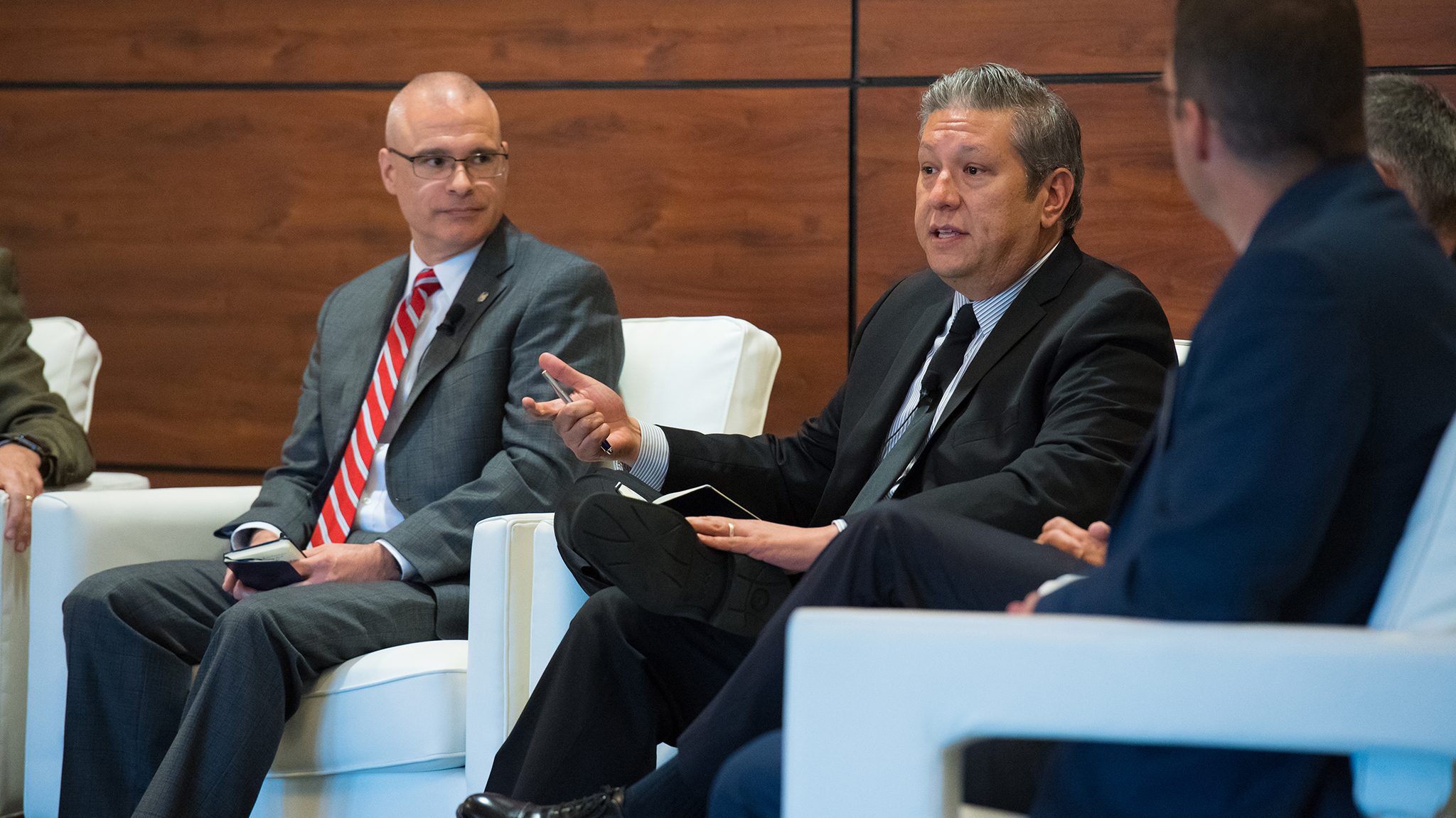
At the third annual University of Mississippi Technology Summit, UM alumnus and technology pioneer Jim Barksdale, far left, led a panel titled “Future Opportunities & Challenges in Tech,” which discussed the current trends in technology and what the future might hold. That panel featured, second from left, Nishanth Rodrigues CIO of UM; David Steel of Samsung; John Felker with the Department of Homeland Security, NCCIC; Rob Carter CIO of FedEx; and Kevin O’Toole with Comcast. Photo by Kevin Bain/Ole Miss Digital Imaging Services.
OXFORD, Miss. – An array of business, government and industry leaders gathered Wednesday in Oxford to discuss the critical intersection of technology and education at the third annual University of Mississippi Technology Summit.
During the event at The Inn at Ole Miss, experts in a variety of fields shared visions of the current state of technology, the future of the ever-changing field and how Mississippi can be best poised to succeed in the ongoing technological revolution.
In his welcome remarks, Chancellor Jeffrey Vitter highlighted the interest and commitment to technology shared by Tech Summit attendees.
“You represent a vast array of experiences, and that fits right into the goals of the summit,” Vitter said. “Together, we’re going to explore how we can work in tandem and connect. We can find solutions to problems and discover smart ways to reach our goals.”
Vitter commended U.S. Sen. Roger Wicker, guest of honor at the event, for continuing to prioritize policy on the federal level that will help advance Mississippi and its residents.
Acknowledging the “wealth of brainpower” in the room, Wicker urged the group to think about what Mississippi and the university can be doing to be at the forefront of technology information.
“I hope that we build on the information and discussion we had today and come together with some action items to provide opportunities for job growth here in our state,” said Wicker, who chairs the Senate Subcommittee on Communications, Technology, Innovation and the Internet. “It makes me so optimistic about what we can do.”

University of Mississippi student Elena Bauer speaks to the crowd at the 2018 UM Tech Summit about her time using technology – specifically virtual reality – to show children across Mississippi worlds they might not have ever seen before. Photo by Kevin Bain/Ole Miss Digital Imaging Services.
Continuing with the trend of technology’s impact on society and business, Rob Carter, chief information officer for FedEx, discussed the long road of innovation his company has traveled since 1978, when FedEx were envisioning systems that would harness the power of information, including the ability to electronically track a package.
FedEx was able to develop groundbreaking tools and systems that had a profound impact beyond just the business world through building a culture around the idea of continuous innovation, Carter said.
“We connect people and possibilities around the world, and through that, businesses prosper, communities flourish and people thrive,” Carter said. “We think the connected world is a significantly enhanced world. We think it enables better health care, better education, better access to goods and services.”
The event reinforced the university’s commitment to strengthening STEM education. The summit also complemented many of the university’s recent efforts in this area, including growth of the university’s capacity to address future workforce needs and enhancement of its status as a Carnegie R1 Highest Research Activity institution.
UM’s launch of a transformative research initiative called Flagship Constellations, which seeks to inspire multidisciplinary solutions to some of the region’s and world’s complex problems such as big data and brain wellness, also aligned with the overall goal of the summit.
Some of the successes from these ongoing initiatives came full circle when seven Ole Miss students from a variety of backgrounds took the stage to share how they’ve used technology inside and outside the classroom.
Elena Bauer was born in Champaign, Illinois, but spent her entire childhood living across the United States and Freiburg, Germany. Through her time at Ole Miss and the McLean Institute’s Catalyzing Entrepreneurship and Economic Development Initiative, Bauer has used technology – specifically virtual reality – to show Mississippi children worlds they might not have ever seen.
“We took a virtual reality tour to different places across the world,” said Bauer, of her time working with high students in the Mississippi Delta. “Virtual reality has proven to be an influential educational tool.”

Nick DePorter with LinkedIn speaks during a panel at the 2018 UM Tech Summit titled “Role of Education in Preparing the Workforce,” which discussed the ongoing efforts to prepare today’s students to succeed in tomorrow’s workforce. Photo by Kevin Bain/Ole Miss Digital Imaging Services.
Bauer said she is passionate about exploring the new and innovative ways that technology can assist workforce development and community engagement across Mississippi. She is working with McLean to build a sustainable job-training program for the Clarksdale community.
Making his first trip to Mississippi, Michael Kratsios, White House deputy assistant to the president for technology policy, provided the lunchtime address. Kratsios shared how he looks at emerging technologies with a great sense of optimism, emphasizing how the U.S. must focus on areas of artificial intelligence, autonomous systems and connectivity.
Kratsios concluded his remarks by acknowledging that challenges exist and contending that America remains the best place to drive technological innovation because of its culture.
“What makes the American R&D ecosystem unique is our government, industry and academia working in tandem for innovation,” Kratsios said. “It’s not top-down industrial policy.
“We’ve made our greatest discoveries because of our freedom to invent, explore and discover. This freedom, coupled with our strong free market ideals, is a recipe for continued technological leadership.”
Panels throughout the day focused on a variety of subjects.
UM alumnus and technology pioneer Jim Barksdale led a panel examining “Future Opportunities and Challenges in Tech,” which discussed trends in technology and what the future might hold. That panel featured Carter; John Felker, with the Department of Homeland Security’s National Cybersecurity and Communications Integration Center; Kevin O’Toole, of Comcast; Nishanth Rodrigues, the university’s chief information officer; and David Steel, of Samsung.
Former Mississippi Gov. Haley Barbour led a panel titled “Role of Education in Preparing the Workforce,” which discussed ongoing efforts to prepare students to succeed in tomorrow’s workforce. That panel featured Nick DePorter, with LinkedIn; Hu Meena, of C Spire; Ryan Miller, with the UM Haley Barbour Center for Manufacturing Excellence; Mike Petters, with Huntington Ingalls Industries; and Noel Wilkin, the university’s provost and executive vice chancellor for academic affairs.
Allyson Best, director of the UM Office of Technology Commercialization, led a panel on “Technology Applications in Government and Industry,” which discussed recent technology applications and the process of effectively moving discoveries into action. That panel featured Michael Adcock, of the University of Mississippi Medical Center; Kratsios; Art Morrish, with Raytheon; Willie Nelson, of the U.S. Army Space and Missile Defense Command; and Olivia Trusty, from Wicker’s office.
“Every aspect of our research enterprise will benefit from this event,” Best said. “The opportunity to hear from leaders in industry and government provides valuable insight and helps us shape our strategies in order to maximize the impact of our efforts.”
For more information on the summit or any of the participants, visit http://techsummit.olemiss.edu/.